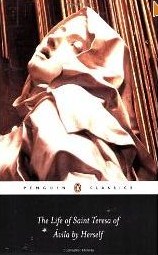Saint Teresa of Ávila
Life of Saint Teresa of Ávila by Herself

I recommend this book, preferably a different edition than this one by Penguin, to those who are looking from a Christian vantage point. The mystic nun of 16th century Spain, you can think anything you want of her, but she ain't ordinary. The spiritual experiences that "befell her is the central theme of the book" (intro. p.13). Her relationship with our Lord is honest and humble, sincere as any testimony that you'll ever hear. The way to approach this story is with respect, and also with humbleness, for that is the way she also approaches us.
I noticed a little bias in the introduction by J.M.Cohen. Or maybe he doesn't have the facts right: "In the very cities where they (Teresa and John of the Cross) walked, Mohammedan mystics, less narrow and exclusive in their beliefs than they, had flourished in the days of the Moorish emirates." This is simply untrue. On the contrary, very much more narrow and exclusive. No need of political correctness when we all know how Muslims always have treated Christians. Try living as a Christian even today in any "tolerant" Muslim country.
Teresa's life is a great testimony for all denominations of Christians. Yes, she was a Catholic, and you will find the Catholic theology sprinkled everywhere; but most importantly she was real, I mean a real Christian. And if you read the text without prejudice -not like a Pharisee- you will find prove of this. Her relationship is with the Lord, not with images. For example, she commends herself to Saint Joseph, but she always has it clear that it is the Lord Jesus who gives the favors: "The Lord seems to have given other saints grace to help in some troubles but I know by experience that this glorious Saint helps in all", and "I clearly see (...) that if we are to please God and He is to grant us great favors, it is His will that this should be through His most sacred Humanity, in whom His Majesty said He is well pleased. (...) I have clearly seen that it is by this door we must enter, if we wish His sovereign Majesty to reveal great secrets to us. He will show us the way. If we consider his life, that is our best example."
There's an episode that I liked particularly. The Lord gives her the grace of talking with angels; she hears: "I want you to converse now not with men but with angels". And so it happens, "For I have never since been able to form a firm friendship, or to take any comfort in, or to feel particular love for, any people except those whom I believe to love God and to be trying to serve Him. This has been something beyond my control; and it has made no difference if the people have been relatives or friends." Anybody feels identified?
Check this one out, as example of good and sensible advice: "the proof that something comes from God lies in its conformity to Holy Scripture. If it diverges in the least from that, I think I should feel incomparably more certain that it came from the devil".
Another fun note, this one about her tribulations with her confessors: "He (the devil) cannot do me any harm, but they, especially if they are confessors, can be most disturbing. For several years they were such a trial to me that now I am astonished that I was able to bear it." Beware of human confessors!
A more curious note: "there is nothing the devils fly from more promptly, never to return, than from holy water. They fly from the cross also, but return again. So there must be a great virtue in holy water." Of course there's no virtue in water, but modern readers who are aware of it should still be able to sympathize with her.
The book is full of commentary of this kind. They all portray the love of this meek woman for the Lord Jesus. This book is so needed today in a world that has gone to the other extreme: devotion of evil, that reading it can seem almost like an ET encounter.
Leave your pride behind before reading.
